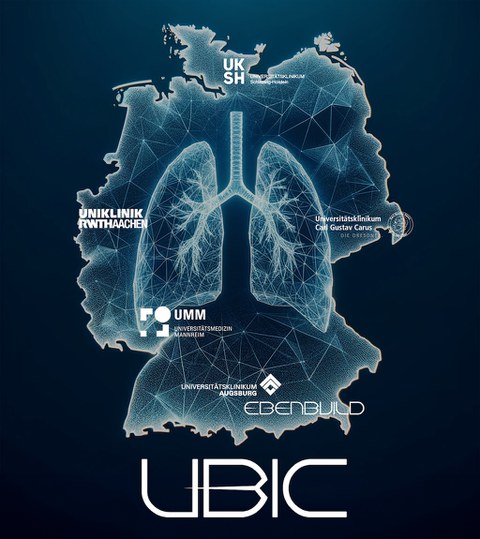Dec 08, 2023
Improving treatment for people who require artificial respiration Researchers and a company want to set new standards with AI-based lung models

Personalisierte Lungenzwillinge zur Behandlung des akuten Atemnotsyndroms/Personalized Lung Twins for the Treatment of Acute Respiratory Distress Syndrome, UBIC
TU Dresden and Ebenbuild receive federal funding as part of the UBIC consortium for the “Digital Lung Twin” project.
Acute respiratory distress syndrome (ARDS) is a life-threatening condition that affects around one in ten patients in intensive care units and around 23 percent of all people who rely on artificial respiration. University medicine in Dresden and Ebenbuild, a company working in the field of personalized, AI-controlled virtual lung development, have been granted funding of up to EUR 1.8 million from the Federal Ministry of Education and Research (BMBF) as part of the UBIC consortium (Personalized Lung Twins for the Treatment of Acute Respiratory Distress Syndrome, UBIC) to support the “Digital Lung Twin” joint project. The funding will enable the development of personalized lung twins for the treatment of respiratory distress syndrome and enables close collaboration with leading university hospitals. The consortium will provide complex data that will enable automated personalization processes, laying the foundation for scalable AI and simulation technology for clinical applications. University Hospital Schleswig-Holstein (UKSH), University Hospital Mannheim, Uniklinik RWTH Aachen (RWTH), Universitätsklinikum Augsburg (UKA) and Carl Gustav Carus University Hospital Dresden (UKDD) are working in partnership with Ebenbuild GmbH.
ARDS is the result of lung damage caused by illnesses such as sepsis or pneumonia, the inhalation of toxic gases, or artificial respiration in the intensive care unit. Critical illnesses such as COVID-19 are also frequently associated with ARDS.
Despite advances in diagnostics and intensive care, early detection and immediate treatment of ARDS are still inadequate. Even today, about 40 percent of ARDS patients do not survive the disease. The figures continued to rise during the COVID pandemic: over 80 percent of deaths following a COVID infection were due to ARDS.
The aim now is to use innovative AI and simulation technologies to improve the treatment outcomes of people in intensive care who require artificial respiration. The Institute and Outpatient Clinics of Anesthesiology and Intensive Therapy of the Carl Gustav Carus University Hospital Dresden at TU Dresden is actively involved in the consortium.
“This research, in collaboration with renowned university hospitals, will not only help to deepen our understanding of ARDS, but will also produce innovations that will improve decision-making in intensive care units worldwide,” says Professor Esther Troost. “As Dean of the Faculty of Medicine of TU Dresden, I am very pleased to see groundbreaking initiatives of this kind.”
Prof. Peter Spieth, Deputy Director of the Institute of Anesthesiology and Intensive Therapy and Head of the ARDS / ECMO Center at the University Hospital Dresden, has been involved in experimental and clinical studies on ARDS for many years. “Over the past eight years in Dresden, we have established one of Germany’s most highly effective ARDS centers. In collaboration with the UBIC consortium, we want to improve the treatment of critically ill patients by developing innovative support systems.”
Prof. Michael Albrecht, Medical Director at Dresden University Hospital: “With this expertise, we are strengthening our competence in intensive care medicine. This is our unique selling point for the Dresden and East Saxony region.”
Contact:
Prof. Peter Spieth
Carl Gustav Carus University Hospital
of TUD Dresden University of Technology
Chair of Anesthesiology and Intensive Therapy
with a concentration in differentiated lung support
Institute and Outpatient Clinics of Anesthesiology and Intensive Therapy
Secretary: +49 351 458-4110
